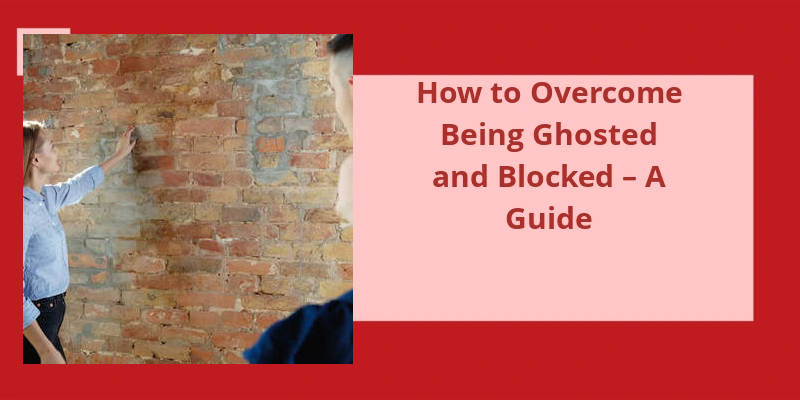How to Overcome Being Ghosted and Blocked – A Guide. The sudden disappearance of someone we once had a connection with can make us question our worth and wonder what went wrong. However, it's crucial not to internalize the ghosting as a reflection of ourselves. It's important to remember that ghosting is an act of the other person, and it says more about them than it does about us. Instead of blaming ourselves, we should set healthy boundaries and protect our emotional well-being by blocking them on social media. By letting go of the blame, we can stop wasting our energy on trying to figure out what went wrong and instead focus on self-care and healing. Engaging in activities that increase our self-care, such as exercise, meditation, and pursuing hobbies we enjoy, can help us rebuild our self-esteem and regain our confidence. It's also essential to surround ourselves with supportive family and friends who can offer a listening ear and provide comfort during this difficult time. Seeking professional help, such as therapy or counseling, can also be beneficial in processing the emotions associated with being ghosted and blocked. Remember that ghosting never feels good, but by following these steps, we can overcome the pain and move forward towards a healthier and happier future.
How Do You Stop Caring About Someone Who Ghosted You?
When youve been ghosted by someone you care about, it’s natural to feel hurt and confused. However, it’s important to remember that this behavior says more about the person ghosting you than it does about you. One of the first steps to stop caring about someone who ghosted you is to stop blaming yourself. Understand that their actions aren’t a reflection of your worth or value as a person.
Allow yourself time to grieve the loss. Ghosting can feel like a rejection, and it’s normal to experience feelings of sadness, anger, and disappointment. Give yourself permission to feel these emotions and process them in a healthy way. This might involve talking to friends, journaling, or seeking support from a therapist.
It can be tempting to seek closure from the person who ghosted you, but the reality is that it might never come. Ghosters often disappear without explanation, leaving you with unanswered questions. Instead of fixating on getting closure from them, focus on finding closure within yourself. Accept that you may never get the answers youre looking for and that it’s okay.
Another important step in moving forward after being ghosted is to prioritize your own wellness. Take care of yourself physically, mentally, and emotionally. Engage in self-care activities that bring you joy and relaxation. This might include exercise, meditation, spending time in nature, or indulging in hobbies you enjoy.
Recognize Patterns and Red Flags to Avoid Future Heartbreak. Reflect on the Relationship and Try to Identify Any Warning Signs That May Have Been Present Before the Ghosting Occurred. This Can Help You Avoid Getting Involved in Similar Situations in the Future.
When dealing with being ghosted and blocked, it’s important to take steps to overcome the situation. One effective strategy is to recognize patterns and red flags, allowing you to avoid future heartbreak. Reflect on the relationship and try to identify any warning signs that may have been present before the ghosting occurred. This insight can be invaluable in helping you steer clear of similar situations in the future.
Is blocking the same as ghosting? While the concept of both may involve cutting off communication, there’s a crucial difference between the two. When ghosting, one has the opportunity to express their thoughts and feelings before vanishing. However, blocking goes a step further by silencing and shutting out the blocked individual without any warning. It’s a complete and sudden disappearance from the blocker’s side, leaving the blocked person silenced and shut-out. Now let’s examine the impacts and reasons behind these actions.
Is Blocking Same as Ghosting?
Is blocking the same as ghosting? Many people may argue that they share similar characteristics, but there’s a subtle yet significant difference between the two. When you’re ghosted, at least there’s some form of communication, even if it’s only one-sided. You can express your final thoughts and feelings to the ghost, hoping for some closure. However, when it comes to blocking, you arent given this option. The blocker puts a figurative sock in the mouth of the blocked and disappears without any warning.
Being blocked can be a distressing experience as you’re left feeling silenced and shut-out. It can leave you questioning your worth and struggling with self-doubt. However, it’s crucial to remember that being blocked is the other persons choice, and it says more about them than it does about you.
To overcome being blocked, it’s essential to focus on self-care and self-reflection. Take this opportunity to invest in yourself, explore your own interests, and strengthen your self-esteem. Seek support from trusted friends or family members who can provide you with a listening ear and words of encouragement.
Additionally, it can be helpful to acknowledge and accept that closure may not be attainable in this situation. It might be challenging to come to terms with the fact that you may never receive an explanation or resolution. However, understanding that closure isn’t dependent on external factors but rather an internal process can empower you to find peace within yourself.
Ultimately, understand that being ghosted or blocked isn’t a reflection of your worth or value as an individual. It’s crucial to prioritize your own well-being and dedicate your energy to healthy and fulfilling relationships. By practicing self-care, seeking support, and reframing your perspective, you can overcome the pain of being blocked and emerge stronger and more resilient than ever before.
The Role of Social Media Etiquette in Blocking and Ghosting
Social media etiquette plays a crucial role in the phenomena of blocking and ghosting. When it comes to blocking someone, it’s important to consider the impact it can have on the other person. Blocking should be used as a last resort when dealing with harassment or extreme negativity.
On the other hand, ghosting refers to the act of abruptly ceasing all communication with someone without any explanation. This can be hurtful and frustrating for the person being ghosted. Practicing good social media etiquette involves clear and honest communication, even if it means expressing discomfort or ending a connection.
By prioritizing open and respectful communication, we can build healthier relationships online and minimize the need for blocking or ghosting. It’s essential to treat others with kindness and empathy, keeping in mind the potential impact of our actions on their emotional well-being.
So why would a ghoster block you? It could be because they’ve a genuine reason for cutting off contact, and they want to ensure that they don’t have to see or interact with you online. On the other hand, if they didn’t take the relationship seriously, they might not bother blocking you and would rather let you freely browse their social media.
Why Would a Ghoster Block You?
One possible explanation for why a ghoster would choose to block you is rooted in the deep-seated reason behind their decision to initially ghost you. When someone is genuinely invested in cutting ties and avoiding any further interaction with you, they may opt to block you as an extra measure to ensure a clean break. By blocking you, they eliminate the chance of accidentally stumbling upon your profile or posts and experiencing any lingering emotions or reminders of the past. Blocking becomes a shield against any potential triggers that could reopen wounds or create confusion.
On the other hand, if the person who ghosted you didn’t take your relationship seriously or simply viewed it as casual, they might not feel the need to block you. In this scenario, they might allow you to roam freely on their social media, perhaps even using your presence as a means to maintain a sense of power or control. This approach could also serve as a way to keep their options open and maintain a sense of freedom, not wanting to completely sever the connection in case they change their mind or want to revisit the past.
However, it’s crucial to remember that every individual and situation is different. It’s difficult to generalize the motivations of someone who ghosts and blocks, as it largely depends on the dynamics of the relationship and the unique circumstances surrounding it. Some people may block out of a desire to protect themselves emotionally, while others might do it out of a lack of maturity or communication skills. Ultimately, it’s important to focus on your own well-being and practice self-care when faced with the pain and confusion of being ghosted and blocked. Seek support from friends, engage in self-reflection, and take steps towards healing and moving forward in a healthy, positive manner.
Source: Ghosted but not blocked
Conclusion
Setting healthy boundaries by blocking them on social media can help you avoid ruminating on the situation. It's crucial not to blame yourself and not make their actions about you. Instead, redirect your energy towards self-care activities and spending time with loved ones who uplift and support you. If the emotional pain persists, it may be beneficial to seek professional help to process and heal from the experience.






